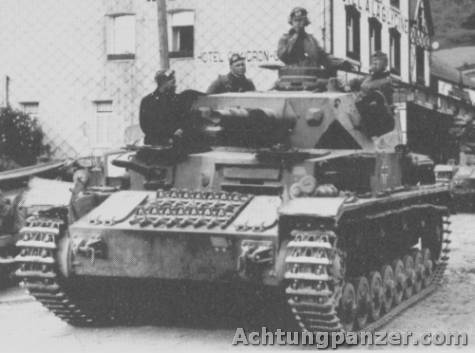
On May 10, 1940, the "phoney war" ended as Nazi troops attacked into Belgium, Luxemborg, the Netherlands, and France. With proof positive that his attempts to make peace with Hitler were doomed, and that the British Empire was woefully unprepared for war, Prime Minister Neville Chamberlain resigns as Prime Minister, and First Lord of the Navy Winston Churchill is asked to form a new government.
Once the Germans had pulled the British Expeditionary Force and the French Fifth Corps (which together represented almost all of the Allies' most modern and most mobile units), a German army spearheaded by Erwin Rommel's 7th Panzer Division crashed through the Ardennes on May 13, enabling the encirclement of the armored forces and severing their roads to Paris. On May 17th, French Premier Paul Reynaud tells British Prime Minister Winston Churchill: "We have been defeated; we have lost the battle."
On May 10, 1940, Winston Churchill became Prime Minister. When he met his Cabinet on May 13 he told them that "I have nothing to offer but blood, toil, tears and sweat." He repeated that phrase later in the day when he asked the House of Commons for a vote of confidence in his new all-party government. The response of Labour was heart-warming; the Conservative reaction was luke-warm. They still really wanted Neville Chamberlain. For the first time, the people had hope but Churchill commented to General Ismay: "Poor people, poor people. They trust me, and I can give them nothing but disaster for quite a long time."

"To form an Administration of this scale and complexity is a serious undertaking in itself, but it must be remembered that we are in the preliminary stage of one of the greatest battles in history, that we are in action at many other points in Norway and in Holland, that we have to be prepared in the Mediterranean, that the air battle is continuous and that many preparations, such as have been indicated by my hon. Friend below the Gangway, have to be made here at home. In this crisis I hope I may be pardoned if I do not address the House at any length today. I hope that any of my friends and colleagues, or former colleagues, who are affected by the political reconstruction, will make allowance, all allowance, for any lack of ceremony with which it has been necessary to act. I would say to the House, as I said to those who have joined this government: 'I have nothing to offer but blood, toil, tears and sweat.'
"We have before us an ordeal of the most grievous kind. We have before us many, many long months of struggle and of suffering. You ask, what is our policy? I can say: It is to wage war, by sea, land and air, with all our might and with all the strength that God can give us; to wage war against a monstrous tyranny, never surpassed in the dark, lamentable catalogue of human crime. That is our policy. You ask, what is our aim? I can answer in one word: It is victory, victory at all costs, victory in spite of all terror, victory, however long and hard the road may be; for without victory, there is no survival. Let that be realised; no survival for the British Empire, no survival for all that the British Empire has stood for, no survival for the urge and impulse of the ages, that mankind will move forward towards its goal. But I take up my task with buoyancy and hope. I feel sure that our cause will not be suffered to fail among men. At this time I feel entitled to claim the aid of all, and I say, 'come then, let us go forward together with our united strength.'"
Winston Churchill
First Speech as Prime Minister, May 13, 1940, House of Commons







No comments:
Post a Comment